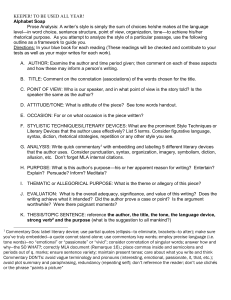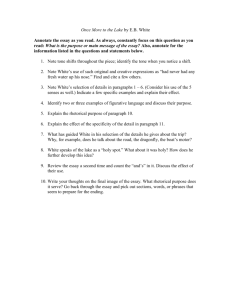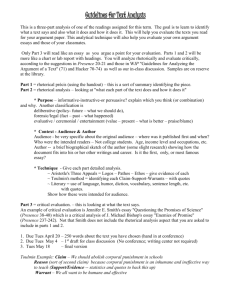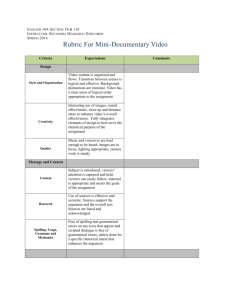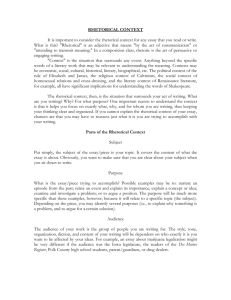RHETORICAL ANALYSIS
advertisement
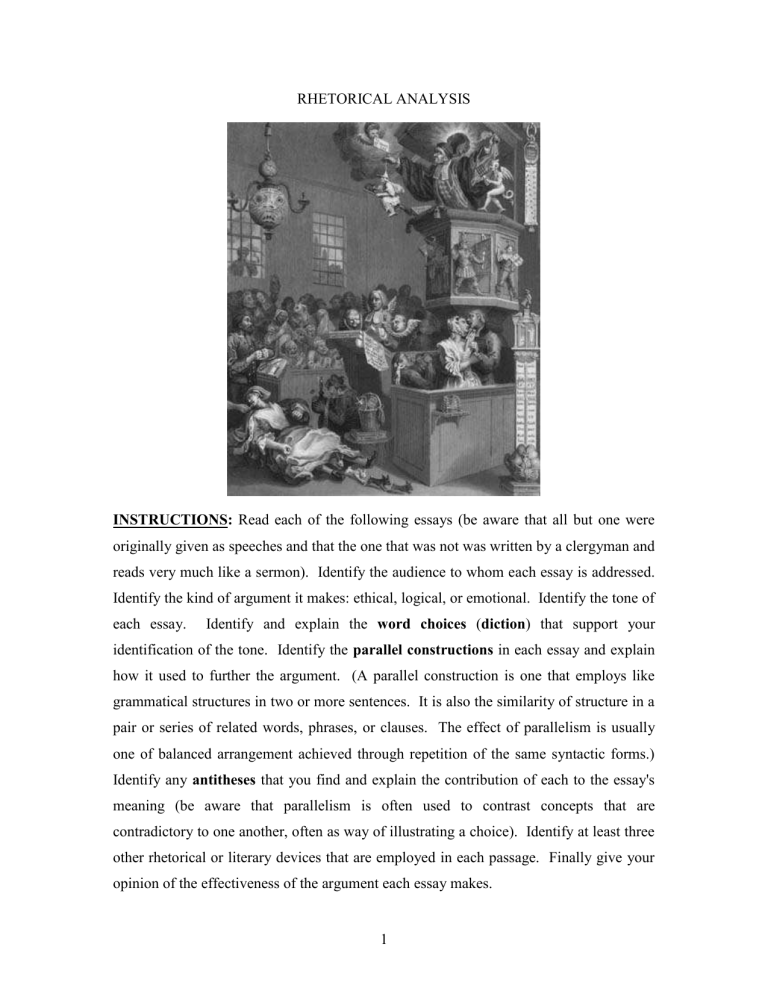
RHETORICAL ANALYSIS INSTRUCTIONS: Read each of the following essays (be aware that all but one were originally given as speeches and that the one that was not was written by a clergyman and reads very much like a sermon). Identify the audience to whom each essay is addressed. Identify the kind of argument it makes: ethical, logical, or emotional. Identify the tone of each essay. Identify and explain the word choices (diction) that support your identification of the tone. Identify the parallel constructions in each essay and explain how it used to further the argument. (A parallel construction is one that employs like grammatical structures in two or more sentences. It is also the similarity of structure in a pair or series of related words, phrases, or clauses. The effect of parallelism is usually one of balanced arrangement achieved through repetition of the same syntactic forms.) Identify any antitheses that you find and explain the contribution of each to the essay's meaning (be aware that parallelism is often used to contrast concepts that are contradictory to one another, often as way of illustrating a choice). Identify at least three other rhetorical or literary devices that are employed in each passage. Finally give your opinion of the effectiveness of the argument each essay makes. 1 John F. Kennedy Inaugural Address Friday, January 20, 1961 Vice President Johnson, Mr. Speaker, Mr. Chief Justice, President Eisenhower, Vice President Nixon, President Truman, reverend clergy, fellow citizens, we observe today not a victory of party, but a celebration of freedom—symbolizing an end, as well as a beginning—signifying renewal, as well as change. For I have sworn before you and Almighty God the same solemn oath our forebears prescribed nearly a century and three quarters ago. The world is very different now. For man holds in his mortal hands the power to abolish all forms of human poverty and all forms of human life. And yet the same revolutionary beliefs for which our forebears fought are still at issue around the globe— the belief that the rights of man come not from the generosity of the state, but from the hand of God. We dare not forget today that we are the heirs of that first revolution. Let the word go forth from this time and place, to friend and foe alike, that the torch has been passed to a new generation of Americans—born in this century, tempered by war, disciplined by a hard and bitter peace, proud of our ancient heritage—and unwilling to witness or permit the slow undoing of those human rights to which this Nation has always been committed, and to which we are committed today at home and around the world. Let every nation know, whether it wishes us well or ill, that we shall pay any price, bear any burden, meet any hardship, support any friend, oppose any foe, in order to assure the survival and the success of liberty. This much we pledge—and more. To those old allies whose cultural and spiritual origins we share, we pledge the loyalty of faithful friends. United, there is little we cannot do in a host of cooperative ventures. Divided, there is little we can do—for we dare not meet a powerful challenge at odds and split asunder. To those new States whom we welcome to the ranks of the free, we pledge our word that one form of colonial control shall not have passed away merely to be replaced 2 by a far more iron tyranny. We shall not always expect to find them supporting our view. But we shall always hope to find them strongly supporting their own freedom—and to remember that, in the past, those who foolishly sought power by riding the back of the tiger ended up inside. To those peoples in the huts and villages across the globe struggling to break the bonds of mass misery, we pledge our best efforts to help them help themselves, for whatever period is required—not because the Communists may be doing it, not because we seek their votes, but because it is right. If a free society cannot help the many who are poor, it cannot save the few who are rich. To our sister republics south of our border, we offer a special pledge—to convert our good words into good deeds—in a new alliance for progress—to assist free men and free governments in casting off the chains of poverty. But this peaceful revolution of hope cannot become the prey of hostile powers. Let all our neighbors know that we shall join with them to oppose aggression or subversion anywhere in the Americas. And let every other power know that this Hemisphere intends to remain the master of its own house. To that world assembly of sovereign states, the United Nations, our last best hope in an age where the instruments of war have far outpaced the instruments of peace, we renew our pledge of support—to prevent it from becoming merely a forum for invective—to strengthen its shield of the new and the weak—and to enlarge the area in which its writ may run. Finally, to those nations who would make themselves our adversary, we offer not a pledge but a request: that both sides begin anew the quest for peace, before the dark powers of destruction unleashed by science engulf all humanity in planned or accidental self-destruction. We dare not tempt them with weakness. For only when our arms are sufficient beyond doubt can we be certain beyond doubt that they will never be employed. But neither can two great and powerful groups of nations take comfort from our present course—both sides overburdened by the cost of modern weapons, both rightly alarmed by the steady spread of the deadly atom, yet both racing to alter that uncertain balance of terror that stays the hand of mankind's final war. 3 So let us begin anew—remembering on both sides that civility is not a sign of weakness, and sincerity is always subject to proof. Let us never negotiate out of fear. But let us never fear to negotiate. Let both sides explore what problems unite us instead of belaboring those problems which divide us. Let both sides, for the first time, formulate serious and precise proposals for the inspection and control of arms—and bring the absolute power to destroy other nations under the absolute control of all nations. Let both sides seek to invoke the wonders of science instead of its terrors. Together let us explore the stars, conquer the deserts, eradicate disease, tap the ocean depths, and encourage the arts and commerce. Let both sides unite to heed in all corners of the earth the command of Isaiah—to "undo the heavy burdens ... and to let the oppressed go free." And if a beachhead of cooperation may push back the jungle of suspicion, let both sides join in creating a new endeavor, not a new balance of power, but a new world of law, where the strong are just and the weak secure and the peace preserved. All this will not be finished in the first 100 days. Nor will it be finished in the first 1,000 days, nor in the life of this Administration, nor even perhaps in our lifetime on this planet. But let us begin. In your hands, my fellow citizens, more than in mine, will rest the final success or failure of our course. Since this country was founded, each generation of Americans has been summoned to give testimony to its national loyalty. The graves of young Americans who answered the call to service surround the globe. Now the trumpet summons us again—not as a call to bear arms, though arms we need; not as a call to battle, though embattled we are—but a call to bear the burden of a long twilight struggle, year in and year out, "rejoicing in hope, patient in tribulation"—a struggle against the common enemies of man: tyranny, poverty, disease, and war itself. Can we forge against these enemies a grand and global alliance, North and South, East and West, that can assure a more fruitful life for all mankind? Will you join in that historic effort? 4 In the long history of the world, only a few generations have been granted the role of defending freedom in its hour of maximum danger. I do not shrink from this responsibility—I welcome it. I do not believe that any of us would exchange places with any other people or any other generation. The energy, the faith, the devotion which we bring to this endeavor will light our country and all who serve it—and the glow from that fire can truly light the world. And so, my fellow Americans: ask not what your country can do for you—ask what you can do for your country. My fellow citizens of the world: ask not what America will do for you, but what together we can do for the freedom of man. Finally, whether you are citizens of America or citizens of the world, ask of us the same high standards of strength and sacrifice which we ask of you. With a good conscience our only sure reward, with history the final judge of our deeds, let us go forth to lead the land we love, asking His blessing and His help, but knowing that here on earth God's work must truly be our own. 5 I Have a Dream Martin Luther King, Jr. I am happy to join with you today in what will go down in history as the greatest demonstration for freedom in the history of our nation. Five score years ago, a great American, in whose symbolic shadow we stand today, signed the Emancipation Proclamation. This momentous decree came as a great beacon light of hope to millions of Negro slaves who had been seared in the flames of withering injustice. It came as a joyous daybreak to end the long night of their captivity. But one hundred years later, the Negro still is not free. One hundred years later, the life of the Negro is still sadly crippled by the manacles of segregation and the chains of discrimination. One hundred years later, the Negro lives on a lonely island of poverty in the midst of a vast ocean of material prosperity. One hundred years later, the Negro is still languishing in the corners of American society and finds himself an exile in his own land. So we have come here today to dramatize a shameful condition. In a sense we have come to our nation's capital to cash a check. When the architects of our republic wrote the magnificent words of the Constitution and the Declaration of Independence, they were signing a promissory note to which every American was to fall heir. This note was a promise that all men, yes, black men as well as white men, would be guaranteed the unalienable rights of life, liberty, and the pursuit of happiness. It is obvious today that America has defaulted on this promissory note insofar as her citizens of color are concerned. Instead of honoring this sacred obligation, America has given the Negro people a bad check, a check which has come back marked "insufficient funds." But we refuse to believe that the bank of justice is bankrupt. We refuse to believe that there are insufficient funds in the great vaults of opportunity of this nation. So we have come to cash this check — a check that will give us upon demand the riches of freedom and the security of justice. We have also come to this hallowed spot to remind America of the fierce urgency of now. This is no time to engage in the luxury of cooling off or to take the tranquilizing drug of gradualism. Now is the time to make real the 6 promises of democracy. Now is the time to rise from the dark and desolate valley of segregation to the sunlit path of racial justice. Now is the time to lift our nation from the quick sands of racial injustice to the solid rock of brotherhood. Now is the time to make justice a reality for all of God's children. It would be fatal for the nation to overlook the urgency of the moment. This sweltering summer of the Negro's legitimate discontent will not pass until there is an invigorating autumn of freedom and equality. Nineteen sixty-three is not an end, but a beginning. Those who hope that the Negro needed to blow off steam and will now be content will have a rude awakening if the nation returns to business as usual. There will be neither rest nor tranquility in America until the Negro is granted his citizenship rights. The whirlwinds of revolt will continue to shake the foundations of our nation until the bright day of justice emerges. But there is something that I must say to my people who stand on the warm threshold which leads into the palace of justice. In the process of gaining our rightful place we must not be guilty of wrongful deeds. Let us not seek to satisfy our thirst for freedom by drinking from the cup of bitterness and hatred. We must forever conduct our struggle on the high plane of dignity and discipline. We must not allow our creative protest to degenerate into physical violence. Again and again we must rise to the majestic heights of meeting physical force with soul force. The marvelous new militancy which has engulfed the Negro community must not lead us to distrust of all white people, for many of our white brothers, as evidenced by their presence here today, have come to realize that their destiny is tied up with our destiny and their freedom is inextricably bound to our freedom. We cannot walk alone. As we walk, we must make the pledge that we shall march ahead. We cannot turn back. There are those who are asking the devotees of civil rights, "When will you be satisfied?" We can never be satisfied as long as the Negro is the victim of the unspeakable horrors of police brutality. We can never be satisfied, as long as our bodies, heavy with the fatigue of travel, cannot gain lodging in the motels of the highways and the hotels of the cities. We can never be satisfied as long as a Negro in Mississippi cannot vote and a Negro in 7 New York believes he has nothing for which to vote. No, no, we are not satisfied, and we will not be satisfied until justice rolls down like waters and righteousness like a mighty stream. I am not unmindful that some of you have come here out of great trials and tribulations. Some of you have come fresh from narrow jail cells. Some of you have come from areas where your quest for freedom left you battered by the storms of persecution and staggered by the winds of police brutality. You have been the veterans of creative suffering. Continue to work with the faith that unearned suffering is redemptive. Go back to Mississippi, go back to Alabama, go back to South Carolina, go back to Georgia, go back to Louisiana, go back to the slums and ghettos of our northern cities, knowing that somehow this situation can and will be changed. Let us not wallow in the valley of despair. I say to you today, my friends, so even though we face the difficulties of today and tomorrow, I still have a dream. It is a dream deeply rooted in the American dream. I have a dream that one day this nation will rise up and live out the true meaning of its creed: "We hold these truths to be self-evident: that all men are created equal." I have a dream that one day on the red hills of Georgia the sons of former slaves and the sons of former slave owners will be able to sit down together at the table of brotherhood. I have a dream that one day even the state of Mississippi, a state sweltering with the heat of injustice, sweltering with the heat of oppression, will be transformed into an oasis of freedom and justice. I have a dream that my four little children will one day live in a nation where they will not be judged by the color of their skin but by the content of their character. I have a dream today. I have a dream that one day, down in Alabama, with its vicious racists, with its governor having his lips dripping with the words of interposition and nullification; one day right 8 there in Alabama, little black boys and black girls will be able to join hands with little white boys and white girls as sisters and brothers. I have a dream today. I have a dream that one day every valley shall be exalted, every hill and mountain shall be made low, the rough places will be made plain, and the crooked places will be made straight, and the glory of the Lord shall be revealed, and all flesh shall see it together. This is our hope. This is the faith that I go back to the South with. With this faith we will be able to hew out of the mountain of despair a stone of hope. With this faith we will be able to transform the jangling discords of our nation into a beautiful symphony of brotherhood. With this faith we will be able to work together, to pray together, to struggle together, to go to jail together, to stand up for freedom together, knowing that we will be free one day. This will be the day when all of God's children will be able to sing with a new meaning, "My country, 'tis of thee, sweet land of liberty, of thee I sing. Land where my fathers died, land of the pilgrim's pride, from every mountainside, let freedom ring." And if America is to be a great nation this must become true. So let freedom ring from the prodigious hilltops of New Hampshire. Let freedom ring from the mighty mountains of New York. Let freedom ring from the heightening Alleghenies of Pennsylvania! Let freedom ring from the snowcapped Rockies of Colorado! Let freedom ring from the curvaceous slopes of California! But not only that; let freedom ring from Stone Mountain of Georgia! Let freedom ring from Lookout Mountain of Tennessee! Let freedom ring from every hill and molehill of Mississippi. From every mountainside, let freedom ring. 9 And when this happens, When we allow freedom to ring, when we let it ring from every village and every hamlet, from every state and every city, we will be able to speed up that day when all of God's children, black men and white men, Jews and Gentiles, Protestants and Catholics, will be able to join hands and sing in the words of the old Negro spiritual, "Free at last! free at last! thank God Almighty, we are free at last!" 10 The Gettysburg Address Abraham Lincoln Nov. 19, 1863 Fourscore and seven years ago our fathers brought forth on this continent a new nation, conceived in liberty and dedicated to the proposition that all men are created equal. Now we are engaged in a great civil war, testing whether that nation or any nation so conceived and so dedicated can long endure. We are met on a great battlefield of that war. We have come to dedicate a portion of that field as a final resting-place for those who here gave their lives that that nation might live. It is altogether fitting and proper that we should do this. But in a larger sense, we cannot dedicate, we cannot consecrate, we cannot hallow this ground. The brave men, living and dead who struggled here have consecrated it far above our poor power to add or detract. The world will little note nor long remember what we say here, but it can never forget what they did here. It is for us the living rather to be dedicated here to the unfinished work which they who fought here have thus far so nobly advanced. It is rather for us to be here dedicated to the great task remaining before us—that from these honored dead we take increased devotion to that cause for which they gave the last full measure of devotion—that we here highly resolve that these dead shall not have died in vain, that this nation under God shall have a new birth of freedom, and that government of the people, by the people, for the people shall not perish from the earth. 11 From “The Speech from the Dock” By Robert Emmet I wished to procure for my country the guarantee which Washington procured for America. To procure an aid, which, by its example, would be as important as its valor, disciplined, gallant, pregnant with science and experience; which would perceive the good and polish the rough points of our character. They would come to us as strangers and leave us as friends, after sharing in our perils and elevating our destiny. These were my objects--not to receive new taskmasters but to expel old tyrants: these were my views and these only became Irishmen. It was for these ends I sought aid from France; because France, even as an enemy could not be more implacable than the enemy already in the bosom of my country. [Interruption by the court.] I have been charged with that importance in the efforts to emancipate my country as to be considered the keystone of the combination of Irishmen; or, as Your Lordship expressed it, "the life and blood of conspiracy." You do me honor overmuch. You have given to the subaltern all the credit of a superior. There are men engaged in this conspiracy, who are not only superior to me but even to your own conceptions of yourself, my lord; men, before the splendor of whose genius and virtues, I should bow with respectful deference, and who would think themselves dishonored to be called your friend--who would not disgrace themselves by shaking your bloodstained hand-- [Interruption by the court] What, my lord, shall you tell me, on the passage to that scaffold. Which that tyranny of which you are only the intermediary executioner. Has erected for my murder that I am accountable for all the blood that has and will be shed in this struggle of the oppressed against the oppressor?--shall you tell me this--and must I be so very a slave as not to repel it? I do not fear to approach the omnipotent Judge, to answer for the conduct of my whole life; and am I to be appalled and falsified by a mere remnant of mortality here? By you, too, who, if it were possible to collect all the innocent blood that you have shed in your unhallowed ministry, in one great reservoir. Your Lordship might swim in it. [Interruption by the court.] 12 Let no man dare, when I am dead to charge me with dishonor; let no man attaint my memory by believing that I could have engaged in any cause but that of my country's liberty and independence, or that I could have become the pliant minion of power in the oppression or the miseries of my countrymen. The proclamation of the provisional government speaks for our views; no inference can be tortured from it to countenance barbarity or debasement at home, or subjection, humiliation, or treachery from abroad; I would not have submitted to a foreign oppressor for the same reason that I would resist the foreign and domestic oppressor: in the dignity of freedom I would have fought upon the threshold of my country, and its enemy should enter only by passing over my lifeless corpse. Am I, who lived but for my country, and who have subjected myself to the dangers of the jealous and watchful oppressor, and the bondage of the grave, only to give my countrymen their rights, and my country her independence, and am I to be loaded with calumny and not suffered to resent or repel it--no, God forbid! If the spirits of the illustrious dead participate in the concerns and cares of those who are dear to them in this transitory life--oh, ever dear and venerated shade of my departed father look down with scrutiny upon the conduct of your suffering son; and see if I have even for a moment deviated from those principles of morality and patriotism which it was your care to instill into my youthful mind, and for which I am now to offer up my life! My lords, you are impatient for the sacrifice-the blood which you seek is not congealed by the artificial terrors which surround your victim; it circulates warmly and unruffled, through the channels which God created for noble purposes but which you are bent to destroy for purposes so grievous that they cry to heaven. Be yet patient! I have but a few words more to say. I am going to my cold and silent grave: my lamp of life is nearly extinguished: my race is run: the grave opens to receive me, and I sink into its bosom! I have but one request to ask at my departure from this world--it is the charity of its silence! Let no man write my epitaph: for as no man who knows my motives dare now vindicate them let not prejudice or ignorance asperse them. Let them and me repose in obscurity and peace, and my tomb remain uninscribed, until other times, and other men, can do justice to my character; when my country takes her place among the nations of the earth, then, and not till then, let my epitaph be written. I have done. 13 Meditation XVII From Devotions Upon Emergent Occasions John Donne Nunc lento sonitu dicunt, morieris. Now this bell tolling softly for another, says to me, Thou must die. Perchance he for whom this bell tolls may be so ill as that he knows not it tolls for him; and perchance I may think myself so much better than I am, as that they who are about me and see my state may have caused it to toll for me, and I know not that. The church is catholic, universal, so are all her actions; all that she does belongs to all. When she baptizes a child, that action concerns me; for that child is thereby connected to that head which is my head too, and ingrafted into the body whereof I am a member. And when she buries a man, that action concerns me: all mankind is of one author and is one volume; when one man dies, one chapter is not torn out of the book, but translated into a better language; and every chapter must be so translated. God employs several translators; some pieces are translated by age, some by sickness, some by war, some by justice; but God's hand is in every translation, and his hand shall bind up all our scattered leaves again for that library where every book shall lie open to one another. As therefore the bell that rings a sermon calls not upon the preacher only, but upon the congregation to come, so this bell calls us all; but how much more me, who am brought so near the door by this sickness. There was a contention as far as a suit (in which piety and dignity, religion and estimation, were mingled) which of the religious orders should ring to prayers first in the morning; and it was determined that they should ring first that rose earliest. If we understand aright the dignity of this bell that tolls for our evening prayer, we would be glad to make it ours by rising early, in that application, that it might be ours as well as his whose indeed it is. The bell doth toll for him that thinks it doth; and though it intermit again, yet from that minute that that occasion wrought upon him, he is united to God. Who casts not up his eye to the sun when it rises? but who takes off his eye from a comet when that breaks out? Who bends not his ear to any bell which upon any occasion rings? but who can remove it from that bell which is passing a piece of himself out of this 14 world? No man is an island, entire of itself; every man is a piece of the continent, a part of the main. If a clod be washed away by the sea, Europe is the less, as well as if promontory were, as well as if a manor of thy friend's or of thine own were. Any man's death diminishes me, because I am involved in mankind; and therefore never send to know for whom the bell tolls; it tolls for thee. Neither can we call this a begging of misery or a borrowing of misery, as though we are not miserable enough of ourselves but must fetch in more from the next house, in taking upon us the misery of our neighbors. Truly it were an excusable covetousness if we did; for affliction is a treasure, and scarce any man hath enough of it. No man hath affliction enough that is not matured and ripened by it, and made fit for God by that affliction. If a man carry treasure in bullion, or in a wedge of gold, and have none coined into current moneys, his treasure will not defray him as he travels. Tribulation is treasure in the nature of it, but it is not current money in the use of it, except we get nearer and nearer our home, heaven, by it. Another man may be sick too, and sick to death, and this affliction may lie in his bowels as gold in a mine and be of no use to him; but this bell that tells me of his affliction digs out and applies that gold to me, if by this consideration of another's dangers I take mine own into contemplation and so secure myself by making my recourse to my God, who is our only security. 15 Kennedy Inaugural Audience: Kind of Argument: Tone: Word choices that suggest tone: Explain how word choices suggest tone: Parallel Constructions (identify first and last three words): Contribution of each construction to the essay's meaning: Antitheses (identify first and last three words): 16 Contribution of each antithesis: First Literary or Rhetorical Device: Contribution to meaning: Second Literary or Rhetorical Device: Contribution to meaning: Third Literary or Rhetorical Device: Contribution to meaning: Effectiveness of Argument: 17 Martin Luther King – “I Have a Dream” Audience: Kind of Argument: Tone: Word choices that suggest tone: Explain how word choices suggest tone: Parallel Constructions (identify first and last three words): Contribution of each construction to the essay's meaning: Antitheses (identify first and last three words): 18 Contribution of each antithesis: First Literary or Rhetorical Device: Contribution to meaning: Second Literary or Rhetorical Device: Contribution to meaning: Third Literary or Rhetorical Device: Contribution to meaning: Effectiveness of Argument: 19 Gettysburg Address Audience: Kind of Argument: Tone: Word choices that suggest tone: Explain how word choices suggest tone: Parallel Constructions (identify first and last three words): Contribution of each construction to the essay's meaning: Antitheses (identify first and last three words): 20 Contribution of each antithesis: First Literary or Rhetorical Device: Contribution to meaning: Second Literary or Rhetorical Device: Contribution to meaning: Third Literary or Rhetorical Device: Contribution to meaning: Effectiveness of Argument: 21 Robert Emmett’s Speech from the Dock Audience: Kind of Argument: Tone: Word choices that suggest tone: Explain how word choices suggest tone: Parallel Constructions (identify first and last three words): Contribution of each construction to the essay's meaning: Antitheses (identify first and last three words): 22 Contribution of each antithesis: First Literary or Rhetorical Device: Contribution to meaning: Second Literary or Rhetorical Device: Contribution to meaning: Third Literary or Rhetorical Device: Contribution to meaning: Effectiveness of Argument: 23 John Donne Meditation XVII Audience: Kind of Argument: Tone: Word choices that suggest tone: Explain how word choices suggest tone: Parallel Constructions (identify first and last three words): Contribution of each construction to the essay's meaning: Antitheses (identify first and last three words): 24 Contribution of each antithesis: First Literary or Rhetorical Device: Contribution to meaning: Second Literary or Rhetorical Device: Contribution to meaning: Third Literary or Rhetorical Device: Contribution to meaning: Effectiveness of Argument: 25
